1.前言
该bolg将对近三次的大作业进行总结与分析。近三次大作业主要写了电信计费系统的主要功能,第一次大作业是座机计费功能,第一次电信计费题量不多,只有两题,电信计费第一次设计时较难,另一题比较简单。题第二次大作业总共有三题,电信计费是在第一次座机的基础上新增加了手机计费功能,另外两题比较简单。第三次大作业总共有三题,电信计费是增加短信计费的功能。这三次大作业主要考察了:类的设计,正则表达式。
2.设计与分析
7-1 电信计费系列1-座机计费
实现一个简单的电信计费程序:
假设南昌市电信分公司针对市内座机用户采用的计费方式:
月租20元,接电话免费,市内拨打电话0.1元/分钟,省内长途0.3元/分钟,国内长途拨打0.6元/分钟。不足一分钟按一分钟计。
南昌市的区号:0791,江西省内各地市区号包括:0790~0799以及0701。
输入格式:
输入信息包括两种类型
1、逐行输入南昌市用户开户的信息,每行一个用户,
格式:u-号码 计费类型 (计费类型包括:0-座机 1-手机实时计费 2-手机A套餐)
例如:u-079186300001 0
座机号码除区号外由是7-8位数字组成。
本题只考虑计费类型0-座机计费,电信系列2、3题会逐步增加计费类型。
2、逐行输入本月某些用户的通讯信息,通讯信息格式:
座机呼叫座机:t-主叫号码 接听号码 起始时间 结束时间
t-079186330022 058686330022 2022.1.3 10:00:25 2022.1.3 10:05:11
以上四项内容之间以一个英文空格分隔,
时间必须符合"yyyy.MM.dd HH:mm:ss"格式。提示:使用SimpleDateFormat类。
以上两类信息,先输入所有开户信息,再输入所有通讯信息,最后一行以“end”结束。
注意:
本题非法输入只做格式非法的判断,不做内容是否合理的判断(时间除外,否则无法计算),比如:
1、输入的所有通讯信息均认为是同一个月的通讯信息,不做日期是否在同一个月还是多个月的判定,直接将通讯费用累加,因此月租只计算一次。
2、记录中如果同一电话号码的多条通话记录时间出现重合,这种情况也不做判断,直接 计算每条记录的费用并累加。
3、用户区号不为南昌市的区号也作为正常用户处理。
输出格式:
根据输入的详细通讯信息,计算所有已开户的用户的当月费用(精确到小数点后2位,
单位元)。假设每个用户初始余额是100元。
每条通讯信息单独计费后累加,不是将所有时间累计后统一计费。
格式:号码+英文空格符+总的话费+英文空格符+余额
每个用户一行,用户之间按号码字符从小到大排序。
错误处理:
输入数据中出现的不符合格式要求的行一律忽略。
建议类图:
参见图1、2、3,可根据理解自行调整:
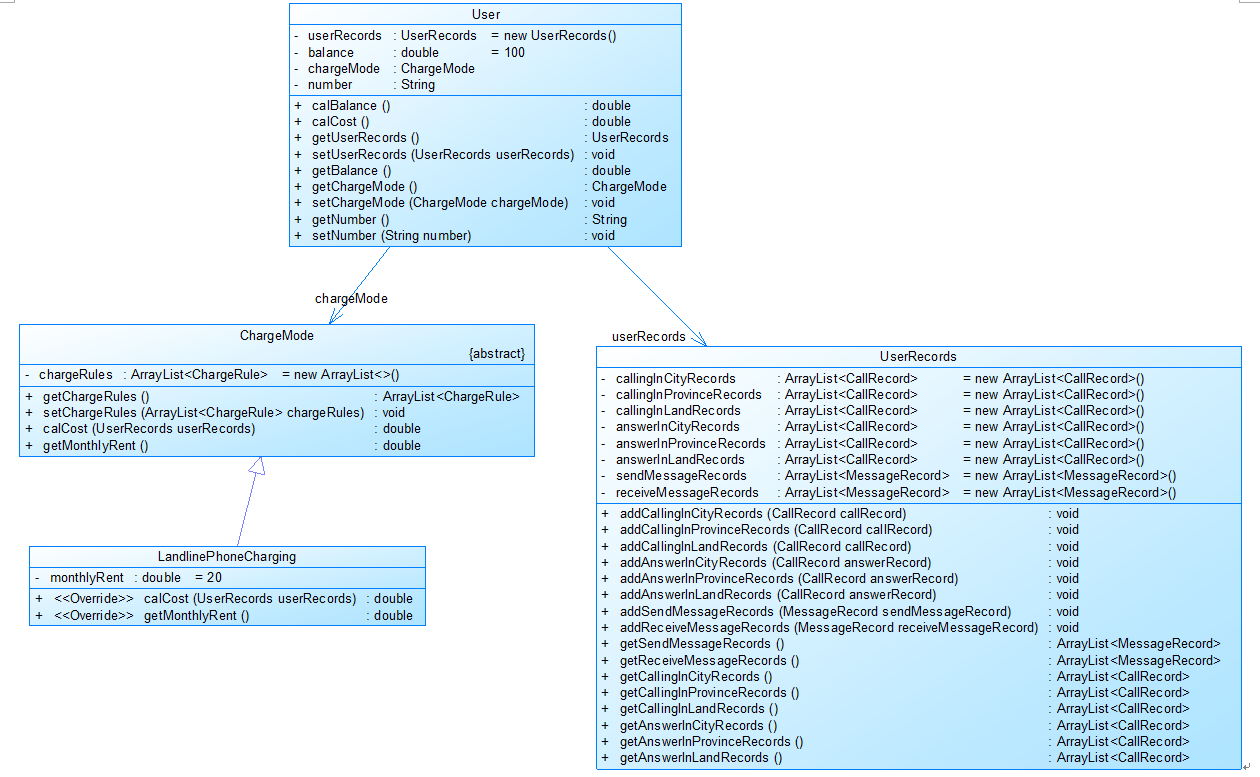
图1
图1中User是用户类,包括属性:
userRecords (用户记录)、balance(余额)、chargeMode(计费方式)、number(号码)。
ChargeMode是计费方式的抽象类:
chargeRules是计费方式所包含的各种计费规则的集合,ChargeRule类的定义见图3。
getMonthlyRent()方法用于返回月租(monthlyRent)。
UserRecords是用户记录类,保存用户各种通话、短信的记录,
各种计费规则将使用其中的部分或者全部记录。
其属性从上到下依次是:
市内拨打电话、省内(不含市内)拨打电话、省外拨打电话、
市内接听电话、省内(不含市内)接听电话、省外接听电话的记录
以及发送短信、接收短信的记录。
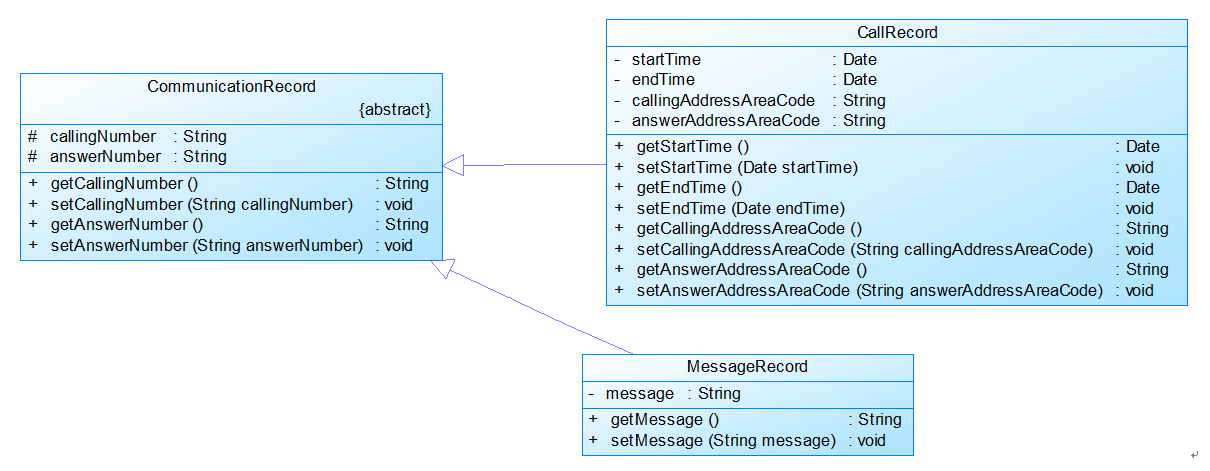
图2
图2中CommunicationRecord是抽象的通讯记录类:
包含callingNumber拨打号码、answerNumber接听号码两个属性。
CallRecord(通话记录)、MessageRecord(短信记录)是它的子类。
CallRecord(通话记录类)包含属性:
通话的起始、结束时间以及
拨号地点的区号(callingAddressAreaCode)、接听地点的区号(answerAddressAreaCode)。
区号用于记录在哪个地点拨打和接听的电话。座机无法移动,就是本机区号,如果是手机号,则会有差异。
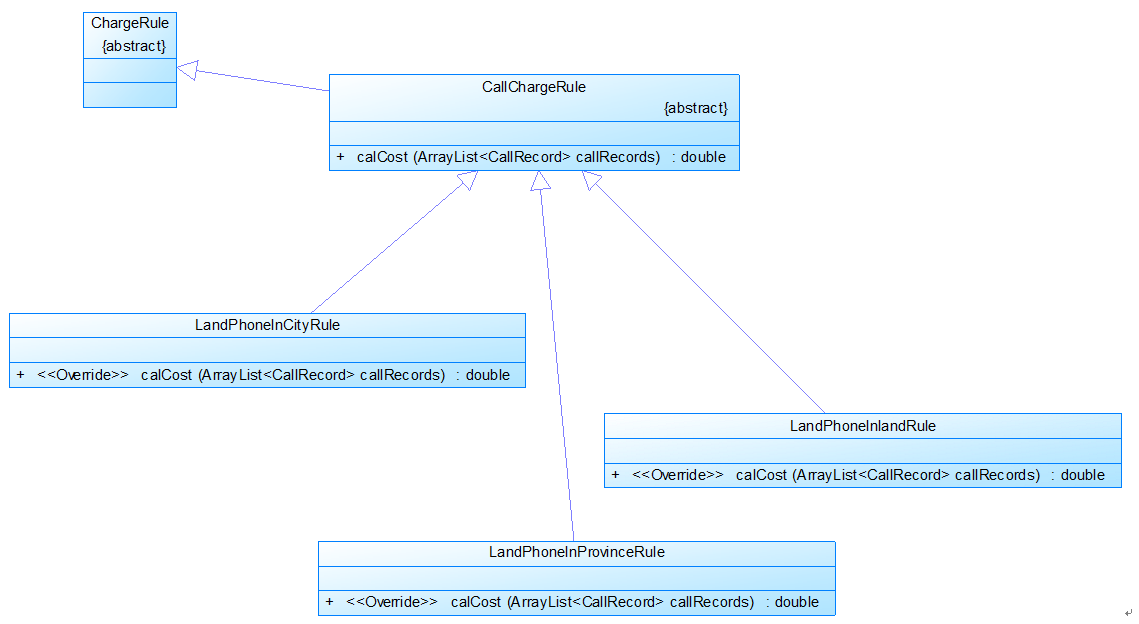
图3
图3是计费规则的相关类,这些类的核心方法是:
calCost(ArrayList<CallRecord> callRecords)。
该方法针根据输入参数callRecords中的所有记录计算某用户的某一项费用;如市话费。
输入参数callRecords的约束条件:必须是某一个用户的符合计费规则要求的所有记录。
LandPhoneInCityRule、LandPhoneInProvinceRule、LandPhoneInLandRule三个类分别是
座机拨打市内、省内、省外电话的计费规则类,用于实现这三种情况的费用计算。
(提示:可以从UserRecords类中获取各种类型的callRecords)。
后续扩展说明:
后续题目集将增加手机用户,手机用户的计费方式中除了与座机计费类似的主叫通话费之外,还包含市外接听电话的漫游费以及发短信的费用。在本题的设计时可统一考虑。
通话记录中,手机需要额外记录拨打/接听的地点的区号,比如:
座机打手机:t-主叫号码 接听号码 接听地点区号 起始时间 结束时间
t-079186330022 13305862264 020 2022.1.3 10:00:25 2022.1.3 10:05:11
手机互打:t-主叫号码 拨号地点 接听号码 接听地点区号 起始时间 结束时间
t-18907910010 0791 13305862264 0371 2022.1.3 10:00:25 2022.1.3 10:05:11
短信的格式:m-主叫号码,接收号码,短信内容
m-18907910010 13305862264 welcome to jiangxi
m-13305862264 18907910010 thank you
输入样例:
在这里给出一组输入。例如:
u-079186300001 0
t-079186300001 058686330022 2022.1.3 10:00:25 2022.1.3 10:05:25
end
输出样例:
在这里给出相应的输出。例如:
079186300001 3.0 77.0
其余参考样例详见附件,未尽事宜以附件样例为准:
import java.math.BigDecimal;
import java.math.RoundingMode;
import java.text.ParseException;
import java.text.SimpleDateFormat;
import java.util.*;
import java.util.regex.Matcher;
import java.util.regex.Pattern;
public class Main {
public static void main(String[] args) {
Scanner sc = new Scanner(System.in);
ArrayList<User> users = new ArrayList<>();
String input = sc.nextLine();
inputdeal inputdeal = new inputdeal();
while(!input.equals("end")){
if(input.matches("^u-[0-9]{11,12} 0$")){
inputdeal.writeUser(users, input);
}
else if(input.matches( "^t-\\d{10,12}\\s\\d{10,12}\\s([1-9][0-9]*\\.[1-9][0-9]?\\.[1-9][0-9]? ([0|1]?[0-9]|2[0-3]):[0-5][0-9]:[0-5][0-9] ?){2}$")){
inputdeal.writeRecord(users, input);
}
input = sc.nextLine();
}
users.sort(new Comparator<User>() {
@Override
public int compare(User u1, User u2) {
if (Double.parseDouble(u1.getNum()) > Double.parseDouble(u2.getNum())) {
return 1;
} else {
return -1;
}
}
});
}
}
class User {
private UserRecords UserRecords = new UserRecords();
private double balance = 100;
private ChargeMode ChargeMode;
private String num;
public double calCost() {
return ChargeMode.calCost(UserRecords);
}
public double calBalance() {
return balance - ChargeMode.getMonthlyRent() - ChargeMode.calCost(UserRecords);
}
public UserRecords getUserRecords() {
return UserRecords;
}
public void setUserRecords(UserRecords userRecords) {
this.UserRecords = userRecords;
}
public ChargeMode getChargeMode() {
return ChargeMode;
}
public void setChargeMode(ChargeMode chargeMode) {
this.ChargeMode = chargeMode;
}
public String getNum() {
return num;
}
public void setNum(String num) {
this.num = num;
}
}
class UserRecords {
private ArrayList<CallRecord> callingInCityRecords = new ArrayList<CallRecord>();
private ArrayList<CallRecord> callingInProvinceRecords = new ArrayList<CallRecord>();
private ArrayList<CallRecord> callingInLandRecords = new ArrayList<CallRecord>();
private ArrayList<CallRecord> answerInCityRecords = new ArrayList<CallRecord>();
private ArrayList<CallRecord> answerInProvinceRecords = new ArrayList<CallRecord>();
private ArrayList<CallRecord> answerInLandRecords = new ArrayList<CallRecord>();
private ArrayList<MessageRecord> sendMessageRecords = new ArrayList<MessageRecord>();
private ArrayList<MessageRecord> receiveMessageRecords = new ArrayList<MessageRecord>();
public void addCallingInCityRecords(CallRecord callRecord) {
callingInCityRecords.add(callRecord);
}
public void addCallingInProvinceRecords(CallRecord callRecord) {
callingInProvinceRecords.add(callRecord);
}
public void addCallingInLandRecords(CallRecord callRecord) {
callingInLandRecords.add(callRecord);
}
public void addAnswerInCityRecords(CallRecord callRecord) {
answerInCityRecords.add(callRecord);
}
public void aaddAnswerInProvinceRecords(CallRecord callRecord) {
answerInProvinceRecords.add(callRecord);
}
public void addAnswerInLandRecords(CallRecord callRecord) {
answerInLandRecords.add(callRecord);
}
public void addSendMessageRecords(MessageRecord callRecord) {
sendMessageRecords.add(callRecord);
}
public void addReceiveMessageRecords(MessageRecord callRecord) {
receiveMessageRecords.add(callRecord);
}
public ArrayList<CallRecord> getCallingInCityRecords() {
return callingInCityRecords;
}
public void setCallingInCityRecords(ArrayList<CallRecord> callingInCityRecords) {
this.callingInCityRecords = callingInCityRecords;
}
public ArrayList<CallRecord> getCallingInProvinceRecords() {
return callingInProvinceRecords;
}
public void setCallingInProvinceRecords(ArrayList<CallRecord> callingInProvinceRecords) {
this.callingInProvinceRecords = callingInProvinceRecords;
}
public ArrayList<CallRecord> getCallingInLandRecords() {
return callingInLandRecords;
}
public void setCallingInLandRecords(ArrayList<CallRecord> callingInLandRecords) {
this.callingInLandRecords = callingInLandRecords;
}
public ArrayList<CallRecord> getAnswerInCityRecords() {
return answerInCityRecords;
}
public void setAnswerInCityRecords(ArrayList<CallRecord> answerInCityRecords) {
this.answerInCityRecords = answerInCityRecords;
}
public ArrayList<CallRecord> getAnswerInProvinceRecords() {
return answerInProvinceRecords;
}
public void setAnswerInProvinceRecords(ArrayList<CallRecord> answerInProvinceRecords) {
this.answerInProvinceRecords = answerInProvinceRecords;
}
public ArrayList<CallRecord> getAnswerInLandRecords() {
return answerInLandRecords;
}
public void setAnswerInLandRecords(ArrayList<CallRecord> answerInLandRecords) {
this.answerInLandRecords = answerInLandRecords;
}
public ArrayList<MessageRecord> getSendMessageRecords() {
return sendMessageRecords;
}
public void setSendMessageRecords(ArrayList<MessageRecord> sendMessageRecords) {
this.sendMessageRecords = sendMessageRecords;
}
public ArrayList<MessageRecord> getReceiveMessageRecords() {
return receiveMessageRecords;
}
public void setReceiveMessageRecords(ArrayList<MessageRecord> receiveMessageRecords) {
this.receiveMessageRecords = receiveMessageRecords;
}
}
abstract class ChargeMode {
protected ArrayList<ChargeRule> chargeRules = new ArrayList<>();
public ArrayList<ChargeRule> getChargeRules() {
return chargeRules;
}
public void setChargeRules(ArrayList<ChargeRule> chargeRules) {
this.chargeRules = chargeRules;
}
public abstract double calCost(UserRecords userRecords);
public abstract double getMonthlyRent();
}
class LandlinePhoneCharging extends ChargeMode {
private double MonthlyRent = 20;
public LandlinePhoneCharging() {
super();
chargeRules.add(new LandPhoneInCityRule());
chargeRules.add(new LandPhoneInProvinceRule());
chargeRules.add(new LandPhoneInlandRule());
}
@Override
public double calCost(UserRecords userRecords) {
double sumCost = 0;
for (ChargeRule rule : chargeRules) {
sumCost += rule.calCost(userRecords);
}
return sumCost;
}
@Override
public double getMonthlyRent() {
return MonthlyRent;
}
}
abstract class CommunicationRecord {
protected String callingNumber;
protected String answerNumber;
public String getCallingNumber() {
return callingNumber;
}
public void setCallingNumber(String callingNumber) {
this.callingNumber = callingNumber;
}
public String getAnswerNumber() {
return answerNumber;
}
public void setAnswerNumber(String answerNumber) {
this.answerNumber = answerNumber;
}
}
class CallRecord extends CommunicationRecord {
private Date startTime;
private Date endTime;
private String callingAddressAreaCode;
private String answerAddressAreaCode;
public int getCallType() {
if (callingAddressAreaCode.equals(answerAddressAreaCode)) {
return 1;
}
if (callingAddressAreaCode.matches("^079[0-9]$") || callingAddressAreaCode.equals("0701")) {
if (answerAddressAreaCode.matches("^079[0-9]$") || answerAddressAreaCode.equals("0701")) {
return 2;
}
}
return 3;
}
public CallRecord(String[] inputs) {
super();
if (inputs[0].length() == 10) {
callingAddressAreaCode = inputs[0].substring(0, 3);
} else {
callingAddressAreaCode = inputs[0].substring(0, 4);
}
if (inputs[1].length() == 10) {
answerAddressAreaCode = inputs[1].substring(0, 3);
} else {
answerAddressAreaCode = inputs[1].substring(0, 4);
}
SimpleDateFormat simpleDateFormat = new SimpleDateFormat("yyyy.MM.dd HH:mm:ss", Locale.getDefault());
try {
startTime = simpleDateFormat.parse(inputs[2] + " " + inputs[3]);
endTime = simpleDateFormat.parse(inputs[4] + " " + inputs[5]);
} catch (ParseException e) {
}
}
public CallRecord(Date startTime, Date endTime, String callingAddressAreaCode, String answerAddressAreaCode) {
super();
this.startTime = startTime;
this.endTime = endTime;
this.callingAddressAreaCode = callingAddressAreaCode;
this.answerAddressAreaCode = answerAddressAreaCode;
}
public Date getStartTime() {
return startTime;
}
public void setStartTime(Date startTime) {
this.startTime = startTime;
}
public Date getEndTime() {
return endTime;
}
public void setEndTime(Date endTime) {
this.endTime = endTime;
}
public String getCallingAddressAreaCode() {
return callingAddressAreaCode;
}
public void setCallingAddressAreaCode(String callingAddressAreaCode) {
this.callingAddressAreaCode = callingAddressAreaCode;
}
public String getAnswerAddressAreaCode() {
return answerAddressAreaCode;
}
public void setAnswerAddressAreaCode(String answerAddressAreaCode) {
this.answerAddressAreaCode = answerAddressAreaCode;
}
}
class MessageRecord extends CommunicationRecord {
String message;
public String getMessage() {
return message;
}
public void setMessage(String message) {
this.message = message;
}
}
abstract class ChargeRule {
abstract public double calCost(UserRecords userRecords);
}
abstract class CallChargeRule extends ChargeRule {
}
class LandPhoneInCityRule extends CallChargeRule {
@Override
public double calCost(UserRecords userRecords) {
double sumCost = 0;
for (CallRecord call : userRecords.getCallingInCityRecords()) {
double distanceS = (-call.getStartTime().getTime() + call.getEndTime().getTime()) / 1000;
if (distanceS < 0) {
continue;
}
double distanceM = (int) distanceS / 60;
if (distanceS % 60 != 0) {
distanceM += 1;
}
sumCost += distanceM * 0.1;
}
return sumCost;
}
}
class LandPhoneInlandRule extends CallChargeRule {
@Override
public double calCost(UserRecords userRecords) {
double sumCost = 0;
for (CallRecord call : userRecords.getCallingInLandRecords()) {
double distanceS = (-call.getStartTime().getTime() + call.getEndTime().getTime()) / 1000;
if (distanceS < 0) {
continue;
}
double distanceM = (int) distanceS / 60;
if (distanceS % 60 != 0) {
distanceM += 1;
}
sumCost += distanceM * 0.6;
}
return sumCost;
}
}
class LandPhoneInProvinceRule extends CallChargeRule {
@Override
public double calCost(UserRecords userRecords) {
double sumCost = 0;
for (CallRecord call : userRecords.getCallingInProvinceRecords()) {
double distanceS = (-call.getStartTime().getTime() + call.getEndTime().getTime()) / 1000;
if (distanceS < 0) {
continue;
}
double distanceM = (int) distanceS / 60;
if (distanceS % 60 != 0) {
distanceM += 1;
}
sumCost += distanceM * 0.3;
}
return sumCost;
}
}
class inputdeal {
public int check(String input) {
String[] inputs = input.split(" ");
if (inputs.length == 2) {
if (inputs[0].matches("^u-[0-9]{11,13}$")) {
if (Integer.parseInt(inputs[1]) >= 0) {
if (Integer.parseInt(inputs[1]) <= 2) {
return 1;
}
}
}
} else if (inputs.length == 6) {
if (validate(inputs[2]))
if (validate(inputs[4]))
if (validatet(inputs[3]))
if (validatet(inputs[5]))
if (inputs[0].matches("[t]-0791[0-9]{7,8}")) {
if (inputs[1].matches(".[0-9]{9,11}"))
return 2;
}
}
return 0;
}
private boolean validatet(String string) {
String[] split = string.split(":");
if (!string.matches("^([0-1]?[0-9]|2[0-3]):([0-5][0-9]):([0-5][0-9])$")) {
return false;
}
return true;
}
}

分析:按着给的类图写,还有要注意区号有三位的
7-1 电信计费系列2-手机+座机计费
实现南昌市电信分公司的计费程序,假设该公司针对手机和座机用户分别采取了两种计费方案,分别如下:
1、针对市内座机用户采用的计费方式(与电信计费系列1内容相同):
月租20元,接电话免费,市内拨打电话0.1元/分钟,省内长途0.3元/分钟,国内长途拨打0.6元/分钟。不足一分钟按一分钟计。
假设本市的区号:0791,江西省内各地市区号包括:0790~0799以及0701。
2、针对手机用户采用实时计费方式:
月租15元,市内省内接电话均免费,市内拨打市内电话0.1元/分钟,市内拨打省内电话0.2元/分钟,市内拨打省外电话0.3元/分钟,省内漫游打电话0.3元/分钟,省外漫游接听0.3元/分钟,省外漫游拨打0.6元/分钟;
注:被叫电话属于市内、省内还是国内由被叫电话的接听地点区号决定,比如以下案例中,南昌市手机用户13307912264在区号为020的广州接听了电话,主叫号码应被计算为拨打了一个省外长途,同时,手机用户13307912264也要被计算省外接听漫游费:
u-13307912264 1
t-079186330022 13307912264 020 2022.1.3 10:00:25 2022.1.3 10:05:11
输入:
输入信息包括两种类型
1、逐行输入南昌市用户开户的信息,每行一个用户,含手机和座机用户
格式:u-号码 计费类型 (计费类型包括:0-座机 1-手机实时计费 2-手机A套餐)
例如:u-079186300001 0
座机号码由区号和电话号码拼接而成,电话号码包含7-8位数字,区号最高位是0。
手机号码由11位数字构成,最高位是1。
本题在电信计费系列1基础上增加类型1-手机实时计费。
手机设置0或者座机设置成1,此种错误可不做判断。
2、逐行输入本月某些用户的通讯信息,通讯信息格式:
座机呼叫座机:t-主叫号码 接听号码 起始时间 结束时间
t-079186330022 058686330022 2022.1.3 10:00:25 2022.1.3 10:05:11
以上四项内容之间以一个英文空格分隔,
时间必须符合"yyyy.MM.dd HH:mm:ss"格式。提示:使用SimpleDateFormat类。
输入格式增加手机接打电话以及收发短信的格式,手机接打电话的信息除了号码之外需要额外记录拨打/接听的地点的区号,比如:
座机打手机:
t-主叫号码 接听号码 接听地点区号 起始时间 结束时间
t-079186330022 13305862264 020 2022.1.3 10:00:25 2022.1.3 10:05:11
手机互打:
t-主叫号码 拨号地点 接听号码 接听地点区号 起始时间 结束时间
t-18907910010 0791 13305862264 0371 2022.1.3 10:00:25 2022.1.3 10:05:11
注意:以上两类信息,先输入所有开户信息,再输入所有通讯信息,最后一行以“end”结束。
输出:
根据输入的详细通讯信息,计算所有已开户的用户的当月费用(精确到小数点后2位,单位元)。假设每个用户初始余额是100元。
每条通讯、短信信息均单独计费后累加,不是将所有信息累计后统一计费。
格式:号码+英文空格符+总的话费+英文空格符+余额
每个用户一行,用户之间按号码字符从小到大排序。
错误处理:
输入数据中出现的不符合格式要求的行一律忽略。
本题只做格式的错误判断,无需做内容上不合理的判断,比如同一个电话两条通讯记录的时间有重合、开户号码非南昌市的号码等,此类情况都当成正确的输入计算。但时间的输入必须符合要求,比如不能输入2022.13.61 28:72:65。
建议类图:
参见图1、2、3:
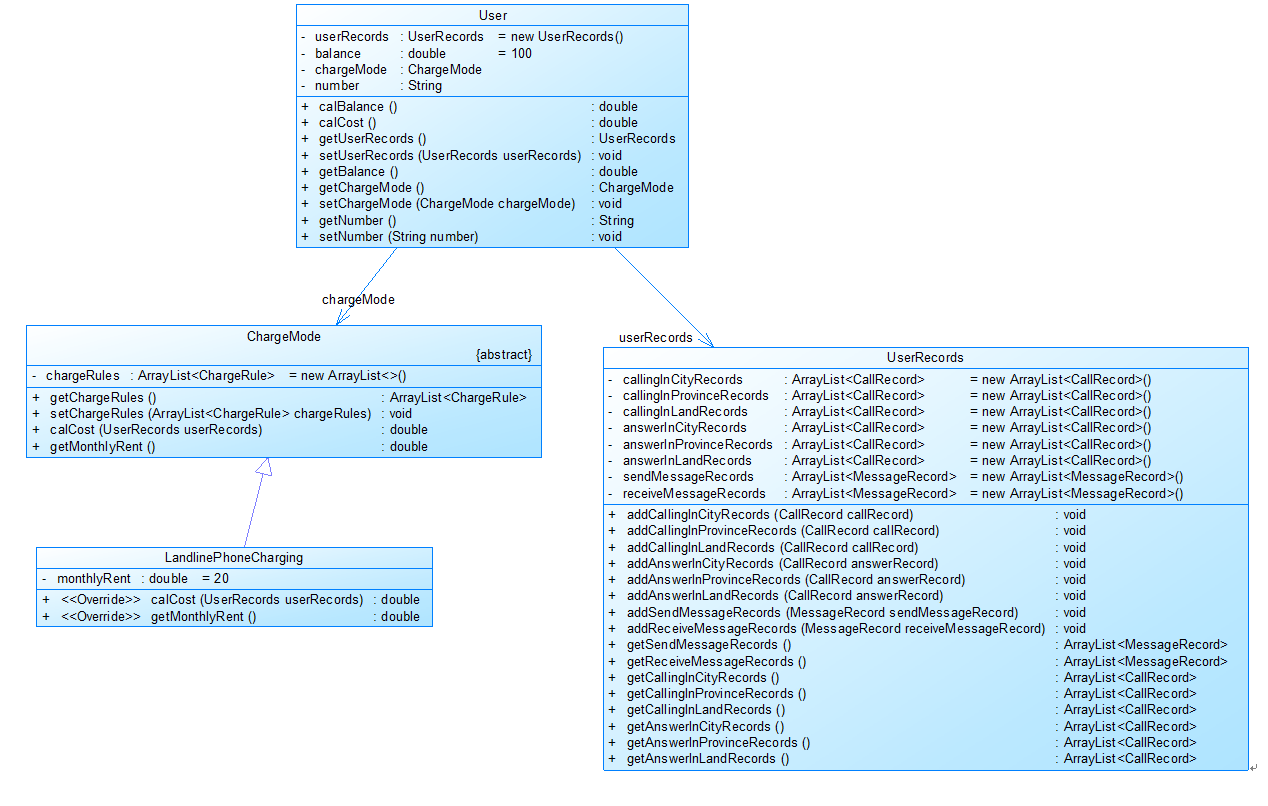
图1
图1中User是用户类,包括属性:
userRecords (用户记录)、balance(余额)、chargeMode(计费方式)、number(号码)。
ChargeMode是计费方式的抽象类:
chargeRules是计费方式所包含的各种计费规则的集合,ChargeRule类的定义见图3。
getMonthlyRent()方法用于返回月租(monthlyRent)。
UserRecords是用户记录类,保存用户各种通话、短信的记录,
各种计费规则将使用其中的部分或者全部记录。
其属性从上到下依次是:
市内拨打电话、省内(不含市内)拨打电话、省外拨打电话、
市内接听电话、省内(不含市内)接听电话、省外接听电话的记录
以及发送短信、接收短信的记录。
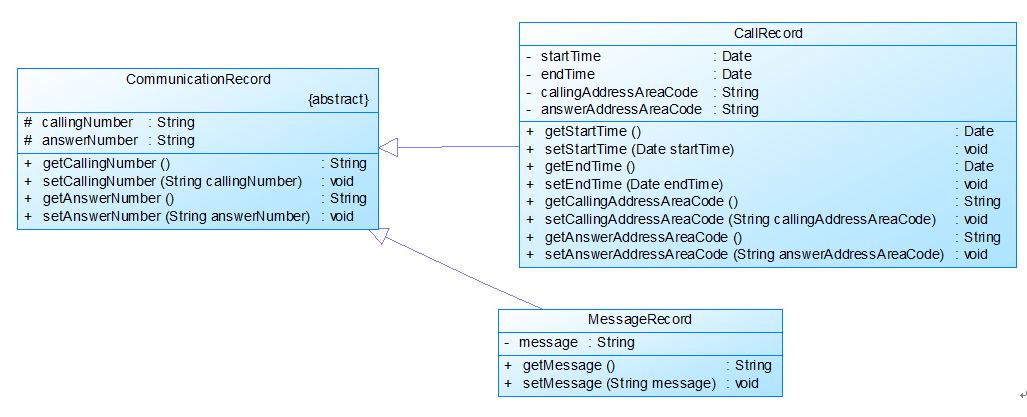
图2
图2中CommunicationRecord是抽象的通讯记录类:
包含callingNumber拨打号码、answerNumber接听号码两个属性。
CallRecord(通话记录)、MessageRecord(短信记录)是它的子类。CallRecord(通话记录类)包含属性:
通话的起始、结束时间以及
拨号地点的区号(callingAddressAreaCode)、接听地点的区号(answerAddressAreaCode)。
区号用于记录在哪个地点拨打和接听的电话。座机无法移动,就是本机区号,如果是手机号,则会有差异。
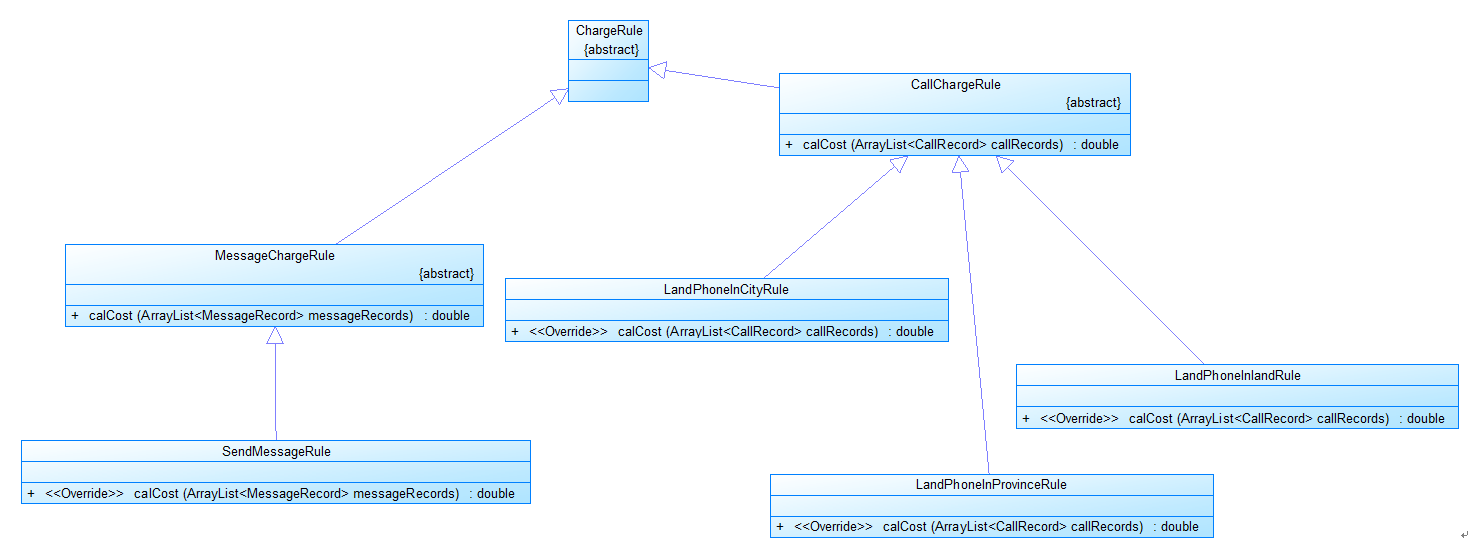
图3
图3是计费规则的相关类,这些类的核心方法是:
calCost(ArrayList<CallRecord> callRecords)。
该方法针根据输入参数callRecords中的所有记录计算某用户的某一项费用;如市话费。
输入参数callRecords的约束条件:必须是某一个用户的符合计费规则要求的所有记录。
SendMessageRule是发送短信的计费规则类,用于计算发送短信的费用。
LandPhoneInCityRule、LandPhoneInProvinceRule、LandPhoneInLandRule三个类分别是座机拨打市内、省内、省外电话的计费规则类,用于实现这三种情况的费用计算。
(提示:可以从UserRecords类中获取各种类型的callRecords)。
注意:以上图中所定义的类不是限定要求,根据实际需要自行补充或修改。
输入样例:
在这里给出一组输入。例如:
u-13811111111 1
t-13811111111 0791 13811111110 020 2022.1.3 08:00:00 2022.1.3 08:09:20
end
输出样例:
在这里给出相应的输出。例如:
13811111111 3.0 82.0
更多内容详见附件:
import pta.LandlinePhoneCharging;
import pta.inputdeal;
import java.text.ParseException;
import java.text.SimpleDateFormat;
import java.util.*;
import java.util.regex.Matcher;
import java.util.regex.Pattern;
public class Main {
public static void main(String[] args) {
ArrayList<User> users = new ArrayList<>();
Scanner in = new Scanner(System.in);
String input = in.nextLine();
while (!input.equals("end")) {
if (1 == inputdeal.check(input)) {
inputdeal.writeUser(users, input);
} else if (2 == inputdeal.check(input)) {
inputdeal.writeRecord(users, input);
}
input = in.nextLine();
}
users.sort(new Comparator<User>() {
@Override
public int compare(User u1, User u2) {
if (u1.getNumber().charAt(0) == '0' && u2.getNumber().charAt(0) != '0') {
return -1;
} else if (u1.getNumber().charAt(0) != '0' && u2.getNumber().charAt(0) == '0') {
return 1;
}
if (Double.parseDouble(u1.getNumber()) > Double.parseDouble(u2.getNumber())) {
return 1;
} else {
return -1;
}
}
});
}
}
abstract class ChargeMode {
protected ArrayList<ChargeRule> chargeRules = new ArrayList<>();
public abstract double calCost(UserRecords userRecords);
public abstract double getMonthlyRent();
public ArrayList<ChargeRule> getChargeRules() {
return chargeRules;
}
public void setChargeRules(ArrayList<ChargeRule> chargeRules) {
this.chargeRules = chargeRules;
}
}
class UserRecords {
private ArrayList<CallRecord> callingInCityRecords = new ArrayList<CallRecord>();
private ArrayList<CallRecord> callingInProvinceRecords = new ArrayList<CallRecord>();
private ArrayList<CallRecord> callingInLandRecords = new ArrayList<CallRecord>();
private ArrayList<CallRecord> answerInCityRecords = new ArrayList<CallRecord>();
private ArrayList<CallRecord> answerInProvinceRecords = new ArrayList<CallRecord>();
private ArrayList<CallRecord> answerInLandRecords = new ArrayList<CallRecord>();
private ArrayList<MessageRecord> sendMessageRecords = new ArrayList<MessageRecord>();
private ArrayList<MessageRecord> receiveMessageRecords = new ArrayList<MessageRecord>();
public void addCallingInCityRecords(CallRecord callRecord) {
callingInCityRecords.add(callRecord);
}
public void addCallingInProvinceRecords(CallRecord callRecord) {
callingInProvinceRecords.add(callRecord);
}
public void addCallingInLandRecords(CallRecord callRecord) {
callingInLandRecords.add(callRecord);
}
public void addAnswerInCityRecords(CallRecord callRecord) {
answerInCityRecords.add(callRecord);
}
public void aaddAnswerInProvinceRecords(CallRecord callRecord) {
answerInProvinceRecords.add(callRecord);
}
public void addAnswerInLandRecords(CallRecord callRecord) {
answerInLandRecords.add(callRecord);
}
public void addSendMessageRecords(MessageRecord callRecord) {
sendMessageRecords.add(callRecord);
}
public void addReceiveMessageRecords(MessageRecord callRecord) {
receiveMessageRecords.add(callRecord);
}
public ArrayList<CallRecord> getCallingInCityRecords() {
return callingInCityRecords;
}
public void setCallingInCityRecords(ArrayList<CallRecord> callingInCityRecords) {
this.callingInCityRecords = callingInCityRecords;
}
public ArrayList<CallRecord> getCallingInProvinceRecords() {
return callingInProvinceRecords;
}
public void setCallingInProvinceRecords(ArrayList<CallRecord> callingInProvinceRecords) {
this.callingInProvinceRecords = callingInProvinceRecords;
}
public ArrayList<CallRecord> getCallingInLandRecords() {
return callingInLandRecords;
}
public void setCallingInLandRecords(ArrayList<CallRecord> callingInLandRecords) {
this.callingInLandRecords = callingInLandRecords;
}
public ArrayList<CallRecord> getAnswerInCityRecords() {
return answerInCityRecords;
}
public void setAnswerInCityRecords(ArrayList<CallRecord> answerInCityRecords) {
this.answerInCityRecords = answerInCityRecords;
}
public ArrayList<CallRecord> getAnswerInProvinceRecords() {
return answerInProvinceRecords;
}
public void setAnswerInProvinceRecords(ArrayList<CallRecord> answerInProvinceRecords) {
this.answerInProvinceRecords = answerInProvinceRecords;
}
public ArrayList<CallRecord> getAnswerInLandRecords() {
return answerInLandRecords;
}
public void setAnswerInLandRecords(ArrayList<CallRecord> answerInLandRecords) {
this.answerInLandRecords = answerInLandRecords;
}
public ArrayList<MessageRecord> getSendMessageRecords() {
return sendMessageRecords;
}
public void setSendMessageRecords(ArrayList<MessageRecord> sendMessageRecords) {
this.sendMessageRecords = sendMessageRecords;
}
public ArrayList<MessageRecord> getReceiveMessageRecords() {
return receiveMessageRecords;
}
public void setReceiveMessageRecords(ArrayList<MessageRecord> receiveMessageRecords) {
this.receiveMessageRecords = receiveMessageRecords;
}
}
class MobilePhoneCharging extends ChargeMode {
private double monthlyRent = 15;
public MobilePhoneCharging() {
super();
chargeRules.add(new MobilePhoneInCityRule());
chargeRules.add(new MobilePhoneInProvinceRule());
chargeRules.add(new MobilePhoneInlandRule());
}
@Override
public double calCost(UserRecords userRecords) {
double sumCost = 0;
for (ChargeRule rule : chargeRules) {
sumCost += rule.calCost(userRecords);
}
return sumCost;
}
@Override
public double getMonthlyRent() {
return monthlyRent;
}
}
class Inputdeal {
public int check(String input) {
if (input.matches("[u]-0791[0-9]{7,8}\\s[0]") || input.matches("[u]-1[0-9]{10}\\s[1]")) {
return 1;
// } else if (input.charAt(0) == 'm') {
// return 2;
} else if (input.matches("(([t]-0791[0-9]{7,8}\\s" + "0[0-9]{9,11}\\s)|"
+ "([t]-0791[0-9]{7,8}\\s" + "1[0-9]{10}\\s" + "0[0-9]{2,3}\\s)|"
+ "([t]-1[0-9]{10}\\s" + "0[0-9]{2,3}\\s" + "0[0-9]{9,11}\\s)|"
+ "([t]-1[0-9]{10}\\s" + "0[0-9]{2,3}\\s" + "1[0-9]{10}\\s" + "0[0-9]{2,3}\\s))"
+ "((([0-9]{3}[1-9]|[0-9]{2}[1-9][0-9]|[0-9][1-9][0-9]{2}|[1-9][0-9]{3})\\.(((0?[13578]|1[02])\\.(0?"
+ "[1-9]|[12][0-9]|3[01]))|(([469]|11)\\.([1-9]|[12][0-9]|30))|(2\\.([1-9]|[1][0-9]|2[0-8]))))|((("
+ "[0-9]{2})([48]|[2468][048]|[13579][26])|(([48]|[2468][048]|[3579][26])00))\\.2\\.29))"
+ "\\s([0-1]?[0-9]|2[0-3]):([0-5][0-9]):([0-5][0-9])\\s"
+ "((([0-9]{3}[1-9]|[0-9]{2}[1-9][0-9]|[0-9][1-9][0-9]{2}|[1-9][0-9]{3})\\.((([13578]|1[02])\\.("
+ "[1-9]|[12][0-9]|3[01]))|(([469]|11)\\.([1-9]|[12][0-9]|30))|(2\\.([1-9]|[1][0-9]|2[0-8]))))|((("
+ "[0-9]{2})([48]|[2468][048]|[13579][26])|(([48]|[2468][048]|[3579][26])00))\\.2\\.29))"
+ "\\s([0-1]?[0-9]|2[0-3]):([0-5][0-9]):([0-5][0-9])")) {
return 2;
}
return 0;
}
@SuppressWarnings("unused")
private boolean validatet(String string) {
if (!string.matches("^([0-1]?[0-9]|2[0-3]):([0-5][0-9]):([0-5][0-9])$")) {
return false;
}
return true;
}
public static boolean validate(String dateString) {
// 使用正则表达式 测试 字符 符合 dddd.dd.dd 的格式(d表示数字)
Pattern p = Pattern.compile("\\d{4}+[\\.]\\d{1,2}+[\\.]\\d{1,2}+");
Matcher m = p.matcher(dateString);
if (!m.matches()) {
return false;
}
// 得到年月日
String[] array = dateString.split("\\.");
int year = Integer.valueOf(array[0]);
int month = Integer.valueOf(array[1]);
int day = Integer.valueOf(array[2]);
if (month < 1 || month > 12) {
return false;
}
int[] monthLengths = new int[] { 0, 31, -1, 31, 30, 31, 30, 31, 31, 30, 31, 30, 31 };
if (isLeapYear(year)) {
monthLengths[2] = 29;
} else {
monthLengths[2] = 28;
}
int monthLength = monthLengths[month];
if (day < 1 || day > monthLength) {
return false;
}
return true;
}
public void writeUser(ArrayList<User> users, String input) {
User usernew = new User();
String[] inputs = input.split(" ");
String num = inputs[0].substring(2);
for (User i : users) {
if (i.getNumber().equals(num)) {
return;
}
}
usernew.setNumber(num);
int mode = Integer.parseInt(inputs[1]);
if (mode == 0) {
usernew.setChargeMode(new LandlinePhoneCharging());
} else if (mode == 1) {
usernew.setChargeMode(new MobilePhoneCharging());
}
users.add(usernew);
}
public void writeRecord(ArrayList<User> users, String input) {
String[] inputs = input.split(" ");
User callu = null, answeru = null;
CallRecord callrecord = new CallRecord(inputs);
if (input.charAt(0) == 't') {
String out = inputs[0];
String in = "";
if (inputs.length == 6) {
in = inputs[1];
} else if (inputs.length == 7) {
in = inputs[1];
} else if (inputs.length == 8) {
in = inputs[2];
}
for (User i : users) {
if (i.getNumber().equals(out)) {
callu = i;
}
if (i.getNumber().equals(in)) {
answeru = i;
}
if (callu != null && answeru != null) {
break;
}
}
if (callu != null) {
if (callrecord.getCallType().matches("^1[1-3]$")) {
callu.getUserRecords().addCallingInCityRecords(callrecord);
} else if (callrecord.getCallType().matches("^2[1-3]$")) {
callu.getUserRecords().addCallingInProvinceRecords(callrecord);
} else {
callu.getUserRecords().addCallingInLandRecords(callrecord);
}
}
if (answeru != null) {
if (callrecord.getCallType().matches("^[1-3]1$")) {
answeru.getUserRecords().addAnswerInCityRecords(callrecord);
} else if (callrecord.getCallType().matches("^[1-3]2$")) {
answeru.getUserRecords().aaddAnswerInProvinceRecords(callrecord);
} else {
answeru.getUserRecords().addAnswerInLandRecords(callrecord);
}
}
} else if (input.charAt(0) == 'm') {
}
}
}
abstract class CommunicationRecord {
protected String callingNumber;
protected String answerNumbe;
public String getCallingNumber() {
return callingNumber;
}
public void setCallingNumber(String callingNumber) {
this.callingNumber = callingNumber;
}
public String getAnswerNumbe() {
return answerNumbe;
}
public void setAnswerNumbe(String answerNumbe) {
this.answerNumbe = answerNumbe;
}
}
abstract class ChargeRule {
abstract public double calCost(UserRecords userRecords);
}
class CallRecord extends CommunicationRecord {
private Date startTime;
private Date endTime;
private String callingAddressAreaCode;
private String answerAddressAreaCode;
public String getCallType() {
String type = "";
if (callingAddressAreaCode.equals("0791")) {
type = type.concat("1");
} else if (callingAddressAreaCode.matches("^079[023456789]$") || callingAddressAreaCode.equals("0701")) {
type = type.concat("2");
} else {
type = type.concat("3");
}
if (answerAddressAreaCode.equals("0791")) {
type = type.concat("1");
} else if (answerAddressAreaCode.matches("^079[023456789]$") || answerAddressAreaCode.equals("0701")) {
type = type.concat("2");
} else {
type = type.concat("3");
}
return type;
}
public CallRecord(String[] inputs) {
super();
char type = inputs[0].charAt(0);
inputs[0] = inputs[0].substring(2);
String sd = null, st = null, ed = null, et = null;
if (type == 't') {
if (inputs.length == 6) {
sd = inputs[2];
st = inputs[3];
ed = inputs[4];
et = inputs[5];
callingAddressAreaCode = inputs[0].substring(0, 4);
answerAddressAreaCode = inputs[1].substring(0, 4);
} else if (inputs.length == 7) {
sd = inputs[3];
st = inputs[4];
ed = inputs[5];
et = inputs[6];
if (inputs[0].charAt(0) != '0') {
if (inputs[2].length() == 10) {
answerAddressAreaCode = inputs[2].substring(0, 3);
} else {
answerAddressAreaCode = inputs[2].substring(0, 4);
}
callingAddressAreaCode = inputs[1];
} else {
if (inputs[0].length() == 10) {
callingAddressAreaCode = inputs[0].substring(0, 3);
} else {
callingAddressAreaCode = inputs[0].substring(0, 4);
}
answerAddressAreaCode = inputs[2];
}
} else if (inputs.length == 8) {
sd = inputs[4];
st = inputs[5];
ed = inputs[6];
et = inputs[7];
callingAddressAreaCode = inputs[1];
answerAddressAreaCode = inputs[3];
}
} else if (type == 'm') {
}
SimpleDateFormat simpleDateFormat = new SimpleDateFormat("yyyy.MM.dd HH:mm:ss", Locale.getDefault());
try {
startTime = simpleDateFormat.parse(sd + " " + st);
endTime = simpleDateFormat.parse(ed + " " + et);
} catch (ParseException e) {
}
}
public CallRecord(Date startTime, Date endTime, String callingAddressAreaCode, String answerAddressAreaCode) {
super();
this.startTime = startTime;
this.endTime = endTime;
this.callingAddressAreaCode = callingAddressAreaCode;
this.answerAddressAreaCode = answerAddressAreaCode;
}
public Date getStartTime() {
return startTime;
}
public void setStartTime(Date startTime) {
this.startTime = startTime;
}
public Date getEndTime() {
return endTime;
}
public void setEndTime(Date endTime) {
this.endTime = endTime;
}
public String getCallingAddressAreaCode() {
return callingAddressAreaCode;
}
public void setCallingAddressAreaCode(String callingAddressAreaCode) {
this.callingAddressAreaCode = callingAddressAreaCode;
}
public String getAnswerAddressAreaCode() {
return answerAddressAreaCode;
}
public void setAnswerAddressAreaCode(String answerAddressAreaCode) {
this.answerAddressAreaCode = answerAddressAreaCode;
}
}
abstract class CallChargeRule extends ChargeRule {
}
class LandPhoneInCityRule extends CallChargeRule {
@Override
public double calCost(UserRecords userRecords) {
double sumCost = 0;
for (CallRecord call : userRecords.getCallingInCityRecords()) {
double distanceS = (-call.getStartTime().getTime() + call.getEndTime().getTime()) / 1000;
if (distanceS < 0) {
continue;
}
double distanceM = (int) distanceS / 60;
if (distanceS % 60 != 0) {
distanceM += 1;
}
if (call.getCallType().equals("11")) {
sumCost += distanceM * 0.1;
} else if (call.getCallType().equals("12")) {
sumCost += distanceM * 0.3;
} else if (call.getCallType().equals("13")) {
sumCost += distanceM * 0.6;
}
}
return sumCost;
}
}
class LandPhoneInlandRule extends CallChargeRule {
@Override
public double calCost(UserRecords userRecords) {
double sumCost = 0;
for (CallRecord call : userRecords.getCallingInLandRecords()) {
double distanceS = (-call.getStartTime().getTime() + call.getEndTime().getTime()) / 1000;
if (distanceS < 0) {
continue;
}
double distanceM = (int) distanceS / 60;
if (distanceS % 60 != 0) {
distanceM += 1;
}
sumCost += distanceM * 0.6;
}
return sumCost;
}
}
class LandPhoneInProvinceRule extends CallChargeRule {
@Override
public double calCost(UserRecords userRecords) {
double sumCost = 0;
for (CallRecord call : userRecords.getCallingInProvinceRecords()) {
double distanceS = (-call.getStartTime().getTime() + call.getEndTime().getTime()) / 1000;
if (distanceS < 0) {
continue;
}
double distanceM = (int) distanceS / 60;
if (distanceS % 60 != 0) {
distanceM += 1;
}
sumCost += distanceM * 0.3;
}
return sumCost;
}
}
class MobilePhoneInCityRule extends CallChargeRule {
@Override
public double calCost(UserRecords userRecords) {
double sumCost = 0;
for (CallRecord call : userRecords.getCallingInCityRecords()) {
double distanceS = (-call.getStartTime().getTime() + call.getEndTime().getTime()) / 1000;
if (distanceS < 0) {
continue;
}
double distanceM = (int) distanceS / 60;
if (distanceS % 60 != 0) {
distanceM += 1;
}
if (call.getCallType().equals("11")) {
sumCost += distanceM * 0.1;
} else if (call.getCallType().equals("12")) {
sumCost += distanceM * 0.2;
} else if (call.getCallType().equals("13")) {
sumCost += distanceM * 0.3;
}
}
return sumCost;
}
}
class MobilePhoneInlandRule extends CallChargeRule {
@Override
public double calCost(UserRecords userRecords) {
double sumCost = 0;
for (CallRecord call : userRecords.getCallingInLandRecords()) {
double distanceS = (-call.getStartTime().getTime() + call.getEndTime().getTime()) / 1000;
if (distanceS < 0) {
continue;
}
double distanceM = (int) distanceS / 60;
if (distanceS % 60 != 0) {
distanceM += 1;
}
sumCost += distanceM * 0.6;
}
for (CallRecord call : userRecords.getAnswerInLandRecords()) {
double distanceS = (-call.getStartTime().getTime() + call.getEndTime().getTime()) / 1000;
if (distanceS < 0) {
continue;
}
double distanceM = (int) distanceS / 60;
if (distanceS % 60 != 0) {
distanceM += 1;
}
sumCost += distanceM * 0.3;
}
return sumCost;
}
}
class MobilePhoneInProvinceRule extends CallChargeRule {
@Override
public double calCost(UserRecords userRecords) {
double sumCost = 0;
for (CallRecord call : userRecords.getCallingInProvinceRecords()) {
double distanceS = (-call.getStartTime().getTime() + call.getEndTime().getTime()) / 1000;
if (distanceS < 0) {
continue;
}
double distanceM = (int) distanceS / 60;
if (distanceS % 60 != 0) {
distanceM += 1;
}
if (call.getCallType().equals("21")) {
sumCost += distanceM * 0.3;
} else if (call.getCallType().equals("22")) {
sumCost += distanceM * 0.3;
} else if (call.getCallType().equals("23")) {
sumCost += distanceM * 0.3;
}
}
return sumCost;
}
}
class MessageRecord extends CommunicationRecord {
private String message;
public String getMessage() {
return message;
}
public void setMessage(String message) {
this.message = message;
}
}
class User {
private UserRecords userRecords = new UserRecords();
private double balance = 100;
private ChargeMode chargeMode;
private String number;
public double calCost() {
return chargeMode.calCost(userRecords);
}
public double calBalance() {
return balance - chargeMode.getMonthlyRent() - chargeMode.calCost(userRecords);
}
public UserRecords getUserRecords() {
return userRecords;
}
public void setUserRecords(UserRecords userRecords) {
this.userRecords = userRecords;
}
public ChargeMode getChargeMode() {
return chargeMode;
}
public void setChargeMode(ChargeMode chargeMode) {
this.chargeMode = chargeMode;
}
public String getNumber() {
return number;
}
public void setNumber(String number) {
this.number = number;
}
}

分析:本次还是按照给的类图写,并且新加入了手机,该题首需要建立User类,里面包含了建户的基本信息,号码,计费类型等属性。
7-1 电信计费系列3-短信计费
实现一个简单的电信计费程序,针对手机的短信采用如下计费方式:
1、接收短信免费,发送短信0.1元/条,超过3条0.2元/条,超过5条0.3元/条。
2、如果一次发送短信的字符数量超过10个,按每10个字符一条短信进行计算。
输入:
输入信息包括两种类型
1、逐行输入南昌市手机用户开户的信息,每行一个用户。
格式:u-号码 计费类型 (计费类型包括:0-座机 1-手机实时计费 2-手机A套餐 3-手机短信计费)
例如:u-13305862264 3
座机号码由区号和电话号码拼接而成,电话号码包含7-8位数字,区号最高位是0。
手机号码由11位数字构成,最高位是1。
本题只针对类型3-手机短信计费。
2、逐行输入本月某些用户的短信信息,短信的格式:
m-主叫号码,接收号码,短信内容 (短信内容只能由数字、字母、空格、英文逗号、英文句号组成)
m-18907910010 13305862264 welcome to jiangxi.
m-13305862264 18907910010 thank you.
注意:以上两类信息,先输入所有开户信息,再输入所有通讯信息,最后一行以“end”结束。
输出:
根据输入的详细短信信息,计算所有已开户的用户的当月短信费用(精确到小数点后2位,单位元)。假设每个用户初始余额是100元。
每条短信信息均单独计费后累加,不是将所有信息累计后统一计费。
格式:号码+英文空格符+总的话费+英文空格符+余额
每个用户一行,用户之间按号码字符从小到大排序。
错误处理:
输入数据中出现的不符合格式要求的行一律忽略。
本题只做格式的错误判断,无需做内容上不合理的判断,比如同一个电话两条通讯记录的时间有重合、开户号码非南昌市的号码、自己给自己打电话等,此类情况都当成正确的输入计算。但时间的输入必须符合要求,比如不能输入2022.13.61 28:72:65。
本题只考虑短信计费,不考虑通信费用以及月租费。
建议类图:
参见图1、2、3:
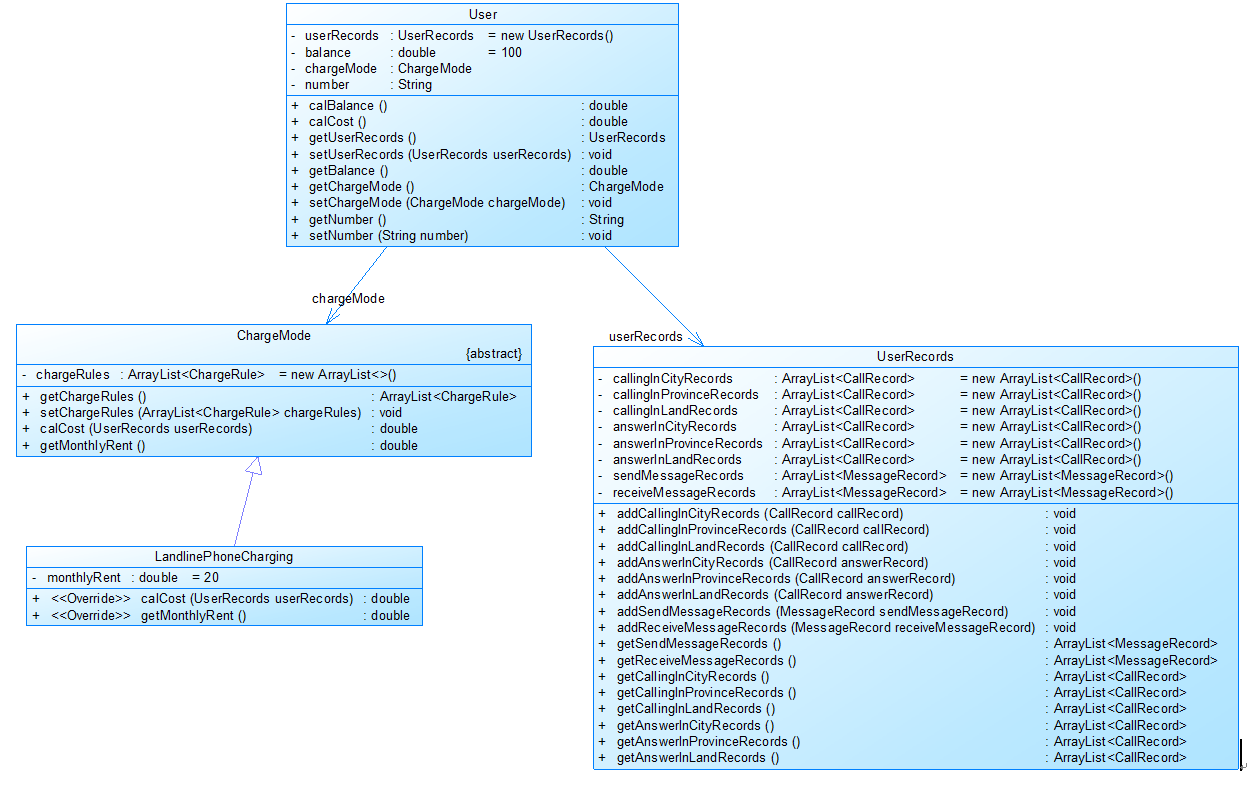
图1
图1中User是用户类,包括属性:
userRecords (用户记录)、balance(余额)、chargeMode(计费方式)、number(号码)。
ChargeMode是计费方式的抽象类:
chargeRules是计费方式所包含的各种计费规则的集合,ChargeRule类的定义见图3。
getMonthlyRent()方法用于返回月租(monthlyRent)。
UserRecords是用户记录类,保存用户各种通话、短信的记录,
各种计费规则将使用其中的部分或者全部记录。
其属性从上到下依次是:
市内拨打电话、省内(不含市内)拨打电话、省外拨打电话、
市内接听电话、省内(不含市内)接听电话、省外接听电话的记录
以及发送短信、接收短信的记录。
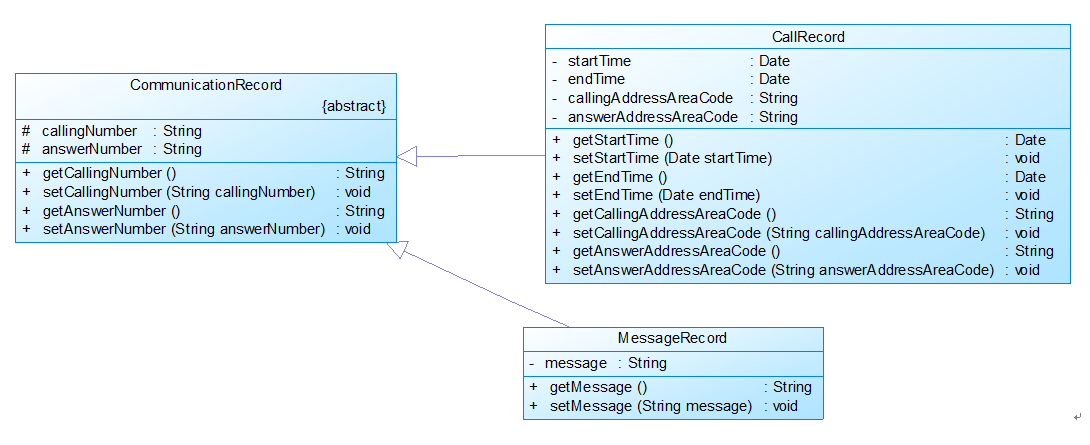
图2
图2中CommunicationRecord是抽象的通讯记录类:
包含callingNumber拨打号码、answerNumber接听号码两个属性。
CallRecord(通话记录)、MessageRecord(短信记录)是它的子类。
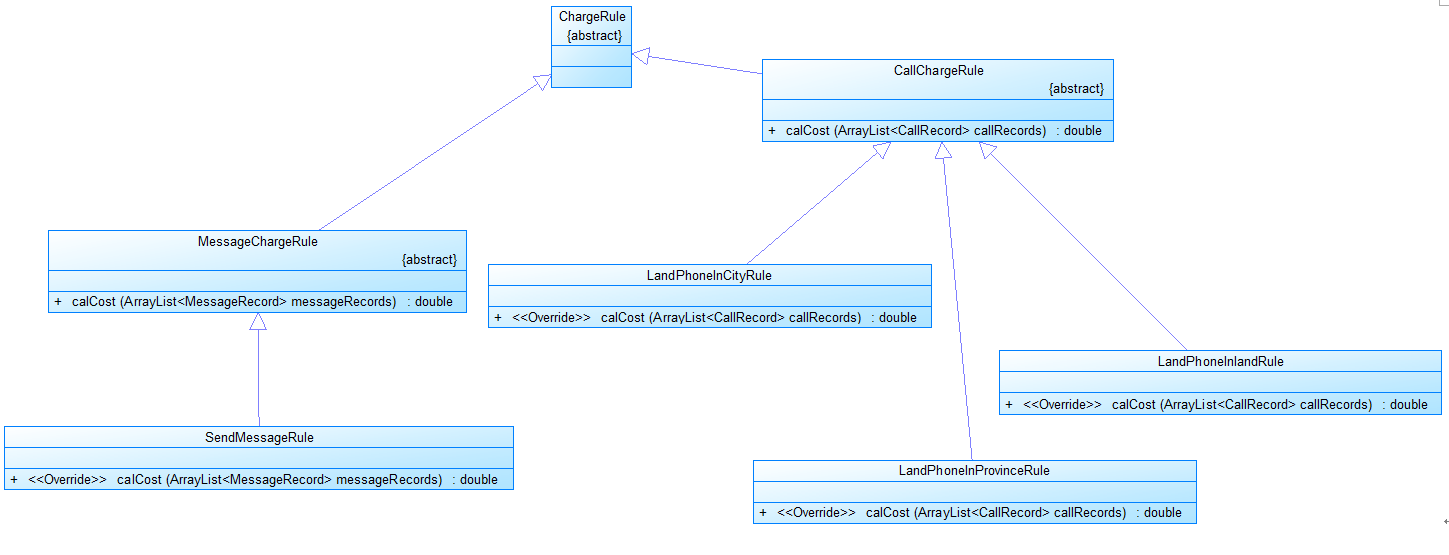
图3
图3是计费规则的相关类,这些类的核心方法是:
calCost(ArrayList callRecords)。
该方法针根据输入参数callRecords中的所有记录计算某用户的某一项费用;如市话费。
输入参数callRecords的约束条件:必须是某一个用户的符合计费规则要求的所有记录。
SendMessageRule是发送短信的计费规则类,用于计算发送短信的费用。
LandPhoneInCityRule、LandPhoneInProvinceRule、LandPhoneInLandRule三个类分别是座机拨打市内、省内、省外电话的计费规则类,用于实现这三种情况的费用计算。
(提示:可以从UserRecords类中获取各种类型的callRecords)。
注意:以上图中所定义的类不是限定要求,根据实际需要自行补充或修改。
输入样例:
在这里给出一组输入。例如:
u-18907910010 3
m-18907910010 13305862264 aaaaaaaaaaaaaaaaaaaaaaa
end
输出样例:
在这里给出相应的输出。例如:
18907910010 0.3 99.7
### 输入样例1:
在这里给出一组输入。例如:
u-18907910010 3
m-18907910010 13305862264 aaaaaaaaaaaa
m-18907910010 13305862264 aaaaaaa.
m-18907910010 13305862264 bb,bbbb
end
输出样例1:
在这里给出相应的输出。例如:
18907910010 0.5 99.5
import pta.CallRecord;
import pta.CommunicationRecord;
import java.text.ParseException;
import java.text.SimpleDateFormat;
import java.util.*;
public class Main {
public static void main(String[] args) {
Inputdeal inputdeal = new Inputdeal();
ArrayList<User> users = new ArrayList<>();
Scanner in = new Scanner(System.in);
String input = in.nextLine();
while (!input.equals("end")) {
if (1 == inputdeal.check(input)) {
inputdeal.writeUser(users, input);
} else if (2 == inputdeal.check(input)) {
inputdeal.writeRecord(users, input);
}
input = in.nextLine();
}
users.sort(new Comparator<User>() {
@Override
public int compare(User u1, User u2) {
if (u1.getNumber().charAt(0) == '0' && u2.getNumber().charAt(0) != '0') {
return -1;
} else if (u1.getNumber().charAt(0) != '0' && u2.getNumber().charAt(0) == '0') {
return 1;
}
if (Double.parseDouble(u1.getNumber()) > Double.parseDouble(u2.getNumber())) {
return 1;
} else {
return -1;
}
}
});
}
}
abstract class ChargeMode {
protected ArrayList<ChargeRule> chargeRules = new ArrayList<>();
public abstract double calCost(UserRecords userRecords);
public abstract double getMonthlyRent();
public ArrayList<ChargeRule> getChargeRules() {
return chargeRules;
}
public void setChargeRules(ArrayList<ChargeRule> chargeRules) {
this.chargeRules = chargeRules;
}
}
class UserRecords {
private ArrayList<CallRecord> callingInCityRecords = new ArrayList<CallRecord>();
private ArrayList<CallRecord> callingInProvinceRecords = new ArrayList<CallRecord>();
private ArrayList<CallRecord> callingInLandRecords = new ArrayList<CallRecord>();
private ArrayList<CallRecord> answerInCityRecords = new ArrayList<CallRecord>();
private ArrayList<CallRecord> answerInProvinceRecords = new ArrayList<CallRecord>();
private ArrayList<CallRecord> answerInLandRecords = new ArrayList<CallRecord>();
private ArrayList<MessageRecord> sendMessageRecords = new ArrayList<MessageRecord>();
private ArrayList<MessageRecord> receiveMessageRecords = new ArrayList<MessageRecord>();
public void addCallingInCityRecords(CallRecord callRecord) {
callingInCityRecords.add(callRecord);
}
public void addCallingInProvinceRecords(CallRecord callRecord) {
callingInProvinceRecords.add(callRecord);
}
public void addCallingInLandRecords(CallRecord callRecord) {
callingInLandRecords.add(callRecord);
}
public void addAnswerInCityRecords(CallRecord callRecord) {
answerInCityRecords.add(callRecord);
}
public void aaddAnswerInProvinceRecords(CallRecord callRecord) {
answerInProvinceRecords.add(callRecord);
}
public void addAnswerInLandRecords(CallRecord callRecord) {
answerInLandRecords.add(callRecord);
}
public void addSendMessageRecords(MessageRecord callRecord) {
sendMessageRecords.add(callRecord);
}
public void addReceiveMessageRecords(MessageRecord callRecord) {
receiveMessageRecords.add(callRecord);
}
public ArrayList<CallRecord> getCallingInCityRecords() {
return callingInCityRecords;
}
public void setCallingInCityRecords(ArrayList<CallRecord> callingInCityRecords) {
this.callingInCityRecords = callingInCityRecords;
}
public ArrayList<CallRecord> getCallingInProvinceRecords() {
return callingInProvinceRecords;
}
public void setCallingInProvinceRecords(ArrayList<CallRecord> callingInProvinceRecords) {
this.callingInProvinceRecords = callingInProvinceRecords;
}
public ArrayList<CallRecord> getCallingInLandRecords() {
return callingInLandRecords;
}
public void setCallingInLandRecords(ArrayList<CallRecord> callingInLandRecords) {
this.callingInLandRecords = callingInLandRecords;
}
public ArrayList<CallRecord> getAnswerInCityRecords() {
return answerInCityRecords;
}
public void setAnswerInCityRecords(ArrayList<CallRecord> answerInCityRecords) {
this.answerInCityRecords = answerInCityRecords;
}
public ArrayList<CallRecord> getAnswerInProvinceRecords() {
return answerInProvinceRecords;
}
public void setAnswerInProvinceRecords(ArrayList<CallRecord> answerInProvinceRecords) {
this.answerInProvinceRecords = answerInProvinceRecords;
}
public ArrayList<CallRecord> getAnswerInLandRecords() {
return answerInLandRecords;
}
public void setAnswerInLandRecords(ArrayList<CallRecord> answerInLandRecords) {
this.answerInLandRecords = answerInLandRecords;
}
public ArrayList<MessageRecord> getSendMessageRecords() {
return sendMessageRecords;
}
public void setSendMessageRecords(ArrayList<MessageRecord> sendMessageRecords) {
this.sendMessageRecords = sendMessageRecords;
}
public ArrayList<MessageRecord> getReceiveMessageRecords() {
return receiveMessageRecords;
}
public void setReceiveMessageRecords(ArrayList<MessageRecord> receiveMessageRecords) {
this.receiveMessageRecords = receiveMessageRecords;
}
}
class LandlinePhoneCharging extends ChargeMode {
private double monthlyRent = 20;
public LandlinePhoneCharging() {
super();
chargeRules.add(new LandPhoneInCityRule());
chargeRules.add(new LandPhoneInProvinceRule());
chargeRules.add(new LandPhoneInlandRule());
}
@Override
public double calCost(UserRecords userRecords) {
double sumCost = 0;
for (ChargeRule rule : chargeRules) {
sumCost += rule.calCost(userRecords);
}
return sumCost;
}
@Override
public double getMonthlyRent() {
return monthlyRent;
}
}
class MobilePhoneCharging extends ChargeMode {
private double monthlyRent = 15;
public MobilePhoneCharging() {
super();
chargeRules.add(new MobilePhoneInCityRule());
chargeRules.add(new MobilePhoneInProvinceRule());
chargeRules.add(new MobilePhoneInlandRule());
}
@Override
public double calCost(UserRecords userRecords) {
double sumCost = 0;
for (ChargeRule rule : chargeRules) {
sumCost += rule.calCost(userRecords);
}
return sumCost;
}
@Override
public double getMonthlyRent() {
return monthlyRent;
}
}
class MobilePhoneMassageCharging extends ChargeMode {
private double monthlyRent = 0;
public MobilePhoneMassageCharging() {
super();
chargeRules.add(new MobilePhoneMessageRule());
}
@Override
public double calCost(UserRecords userRecords) {
double sumCost = 0;
for (ChargeRule rule : chargeRules) {
sumCost += rule.calCost(userRecords);
}
return sumCost;
}
@Override
public double getMonthlyRent() {
return monthlyRent;
}
}
class Inputdeal {
public int check(String input) {
if (input.matches("[u]-0791[0-9]{7,8}\\s[0]") || input.matches("[u]-1[0-9]{10}\\s[13]")) {
return 1;
} else if (input.matches("[m]-1[0-9]{10}\\s" + "1[0-9]{10}\\s" + "[0-9a-zA-Z\\s\\.,]+")) {
return 2;
}
return 0;
}
public void writeUser(ArrayList<User> users, String input) {
User usernew = new User();
String[] inputs = input.split(" ");
String num = inputs[0].substring(2);
for (User i : users) {
if (i.getNumber().equals(num)) {
return;
}
}
usernew.setNumber(num);
int mode = Integer.parseInt(inputs[1]);
if (mode == 0) {
usernew.setChargeMode(new LandlinePhoneCharging());
} else if (mode == 1) {
usernew.setChargeMode(new MobilePhoneCharging());
} else if (mode == 3) {
usernew.setChargeMode(new MobilePhoneMassageCharging());
}
users.add(usernew);
}
public void writeRecord(ArrayList<User> users, String input) {
String[] inputs = input.split(" ");
inputs[0] = inputs[0].substring(2);
User callu = null, answeru = null;
String out = inputs[0];
String in = "";
if (inputs.length == 6) {
in = inputs[1];
} else if (inputs.length == 7) {
in = inputs[1];
} else if (inputs.length == 8) {
in = inputs[2];
} else {
in = inputs[1];
}
for (User i : users) {
if (i.getNumber().equals(out)) {
callu = i;
}
if (i.getNumber().equals(in)) {
answeru = i;
}
if (callu != null && answeru != null) {
break;
}
}
if (input.charAt(0) == 'm') {
MessageRecord messageRecord = new MessageRecord(input);
if (callu != null) {
callu.getUserRecords().addSendMessageRecords(messageRecord);
;
}
if (answeru != null) {
callu.getUserRecords().addReceiveMessageRecords(messageRecord);
}
}
}
}
abstract class ChargeRule {
abstract public double calCost(UserRecords userRecords);
}
public CallRecord(String[] inputs) {
super();
char type = inputs[0].charAt(0);
String sd = null, st = null, ed = null, et = null;
if (type == 't') {
if (inputs.length == 6) {
sd = inputs[2];
st = inputs[3];
ed = inputs[4];
et = inputs[5];
callingAddressAreaCode = inputs[0].substring(0, 4);
answerAddressAreaCode = inputs[1].substring(0, 4);
} else if (inputs.length == 7) {
sd = inputs[3];
st = inputs[4];
ed = inputs[5];
et = inputs[6];
if (inputs[0].charAt(0) != '0') {
if (inputs[2].length() == 10) {
answerAddressAreaCode = inputs[2].substring(0, 3);
} else {
answerAddressAreaCode = inputs[2].substring(0, 4);
}
callingAddressAreaCode = inputs[1];
} else {
if (inputs[0].length() == 10) {
callingAddressAreaCode = inputs[0].substring(0, 3);
} else {
callingAddressAreaCode = inputs[0].substring(0, 4);
}
answerAddressAreaCode = inputs[2];
}
} else if (inputs.length == 8) {
sd = inputs[4];
st = inputs[5];
ed = inputs[6];
et = inputs[7];
callingAddressAreaCode = inputs[1];
answerAddressAreaCode = inputs[3];
}
} else if (type == 'm') {
}
SimpleDateFormat simpleDateFormat = new SimpleDateFormat("yyyy.MM.dd HH:mm:ss", Locale.getDefault());
try {
startTime = simpleDateFormat.parse(sd + " " + st);
endTime = simpleDateFormat.parse(ed + " " + et);
} catch (ParseException e) {
}
}
public CallRecord(Date startTime, Date endTime, String callingAddressAreaCode, String answerAddressAreaCode) {
super();
this.startTime = startTime;
this.endTime = endTime;
this.callingAddressAreaCode = callingAddressAreaCode;
this.answerAddressAreaCode = answerAddressAreaCode;
}
public Date getStartTime() {
return startTime;
}
public void setStartTime(Date startTime) {
this.startTime = startTime;
}
public Date getEndTime() {
return endTime;
}
public void setEndTime(Date endTime) {
this.endTime = endTime;
}
public String getCallingAddressAreaCode() {
return callingAddressAreaCode;
}
public void setCallingAddressAreaCode(String callingAddressAreaCode) {
this.callingAddressAreaCode = callingAddressAreaCode;
}
public String getAnswerAddressAreaCode() {
return answerAddressAreaCode;
}
public void setAnswerAddressAreaCode(String answerAddressAreaCode) {
this.answerAddressAreaCode = answerAddressAreaCode;
}
}
abstract class CallChargeRule extends ChargeRule {
}
class LandPhoneInCityRule extends CallChargeRule {
@Override
public double calCost(UserRecords userRecords) {
double sumCost = 0;
for (CallRecord call : userRecords.getCallingInCityRecords()) {
double distanceS = (-call.getStartTime().getTime() + call.getEndTime().getTime()) / 1000;
if (distanceS < 0) {
continue;
}
double distanceM = (int) distanceS / 60;
if (distanceS % 60 != 0) {
distanceM += 1;
}
if (call.getCallType().equals("11")) {
sumCost += distanceM * 0.1;
} else if (call.getCallType().equals("12")) {
sumCost += distanceM * 0.3;
} else if (call.getCallType().equals("13")) {
sumCost += distanceM * 0.6;
}
}
return sumCost;
}
}
class LandPhoneInlandRule extends CallChargeRule {
@Override
public double calCost(UserRecords userRecords) {
double sumCost = 0;
for (CallRecord call : userRecords.getCallingInLandRecords()) {
double distanceS = (-call.getStartTime().getTime() + call.getEndTime().getTime()) / 1000;
if (distanceS < 0) {
continue;
}
double distanceM = (int) distanceS / 60;
if (distanceS % 60 != 0) {
distanceM += 1;
}
sumCost += distanceM * 0.6;
}
return sumCost;
}
}
class LandPhoneInProvinceRule extends CallChargeRule {
@Override
public double calCost(UserRecords userRecords) {
double sumCost = 0;
for (CallRecord call : userRecords.getCallingInProvinceRecords()) {
double distanceS = (-call.getStartTime().getTime() + call.getEndTime().getTime()) / 1000;
if (distanceS < 0) {
continue;
}
double distanceM = (int) distanceS / 60;
if (distanceS % 60 != 0) {
distanceM += 1;
}
sumCost += distanceM * 0.3;
}
return sumCost;
}
}
class MobilePhoneInCityRule extends CallChargeRule {
@Override
public double calCost(UserRecords userRecords) {
double sumCost = 0;
for (CallRecord call : userRecords.getCallingInCityRecords()) {
double distanceS = (-call.getStartTime().getTime() + call.getEndTime().getTime()) / 1000;
if (distanceS < 0) {
continue;
}
double distanceM = (int) distanceS / 60;
if (distanceS % 60 != 0) {
distanceM += 1;
}
if (call.getCallType().equals("11")) {
sumCost += distanceM * 0.1;
} else if (call.getCallType().equals("12")) {
sumCost += distanceM * 0.2;
} else if (call.getCallType().equals("13")) {
sumCost += distanceM * 0.3;
}
}
return sumCost;
}
}
class MobilePhoneInlandRule extends CallChargeRule {
@Override
public double calCost(UserRecords userRecords) {
double sumCost = 0;
for (CallRecord call : userRecords.getCallingInLandRecords()) {
double distanceS = (-call.getStartTime().getTime() + call.getEndTime().getTime()) / 1000;
if (distanceS < 0) {
continue;
}
double distanceM = (int) distanceS / 60;
if (distanceS % 60 != 0) {
distanceM += 1;
}
sumCost += distanceM * 0.6;
}
for (CallRecord call : userRecords.getAnswerInLandRecords()) {
double distanceS = (-call.getStartTime().getTime() + call.getEndTime().getTime()) / 1000;
if (distanceS < 0) {
continue;
}
double distanceM = (int) distanceS / 60;
if (distanceS % 60 != 0) {
distanceM += 1;
}
sumCost += distanceM * 0.3;
}
return sumCost;
}
}
class MobilePhoneInProvinceRule extends CallChargeRule {
@Override
public double calCost(UserRecords userRecords) {
double sumCost = 0;
for (CallRecord call : userRecords.getCallingInProvinceRecords()) {
double distanceS = (-call.getStartTime().getTime() + call.getEndTime().getTime()) / 1000;
if (distanceS < 0) {
continue;
}
double distanceM = (int) distanceS / 60;
if (distanceS % 60 != 0) {
distanceM += 1;
}
if (call.getCallType().equals("21")) {
sumCost += distanceM * 0.3;
} else if (call.getCallType().equals("22")) {
sumCost += distanceM * 0.3;
} else if (call.getCallType().equals("23")) {
sumCost += distanceM * 0.3;
}
}
return sumCost;
}
}
class MobilePhoneMessageRule extends CallChargeRule {
@Override
public double calCost(UserRecords userRecords) {
double sumCost = 0;
int number = 0;
for (MessageRecord m : userRecords.getSendMessageRecords()) {
int length = m.getMessage().length();
if (length <= 10) {
number++;
} else {
number += length / 10;
if (length % 10 != 0) {
number++;
}
}
}
if (number <= 3) {
sumCost = number * 0.1;
} else if (number <= 5) {
sumCost = 0.3 + 0.2 * (number - 3);
} else {
sumCost = 0.7 + 0.3 * (number - 5);
}
return sumCost;
}
}
class MessageRecord extends CommunicationRecord {
private String message;
public MessageRecord(String input) {
super();
this.message = input.substring(26);
}
public String getMessage() {
return message;
}
public void setMessage(String message) {
this.message = message;
}
}
class User {
private UserRecords userRecords = new UserRecords();
private double balance = 100;
private ChargeMode chargeMode;
private String number;
public double calCost() {
return chargeMode.calCost(userRecords);
}
public double calBalance() {
return balance - chargeMode.getMonthlyRent() - chargeMode.calCost(userRecords);
}
public UserRecords getUserRecords() {
return userRecords;
}
public void setUserRecords(UserRecords userRecords) {
this.userRecords = userRecords;
}
public ChargeMode getChargeMode() {
return chargeMode;
}
public void setChargeMode(ChargeMode chargeMode) {
this.chargeMode = chargeMode;
}
public String getNumber() {
return number;
}
public void setNumber(String number) {
this.number = number;
}
}

分析:这次只需要写短信计费就行
3.踩坑心得
1.正则表达式还是很容易出现错误
2.数据进行处理时,代码的复杂度过高时,每次新增功能时都很麻烦。
3.没有考虑一些较为特殊的情况,如区号为三位
4.最后的短信计费可能因为代码过长无法提交
4.改进建议
多分几个类,以此提高代码复用率,减少代码的复杂性。使用父类,抽象类,对代码进行忧化。
5.总结
在这几周最大的收获就是了解了许多设计模式,也明白了设计模式的重要性, 设计模式是一套经过反复使用的代码设计经验,目的是为了重用代码、让代码更容易被他人理解、保证代码可靠性。在后续的学习中多了解设计模式并将其用于代码中提高代码质量。
标签:inputs,return,double,ArrayList,BLOG,void,public From: https://www.cnblogs.com/wuwuwang/p/16971850.html